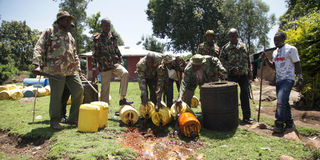Chang’aa in water bottles: How Kisii dealers are beating the system

Police discard illegal brew during a raid in Nyakach.
Kisii brewers and traders in illicit alcohol have devised new ways of evading authorities and are now packaging the illicit liquor in water bottles.
Some of those charged with fighting the vice have turned into accomplices and beneficiaries of the many years of trade and are now protecting the brewers.
The packaging of the brew, especially chang’aa, in water bottles makes it hard for authorities to detect it.
Catholic Priest Lawrence Nyaanga, who partners with the National Authority for the Campaign Against Alcohol and Drug Abuse (Nacada) to fight the illicit brews, says police and chiefs who are supposed to enforce the law against the illicit brew have become the conduit in the illegal trade, protecting the brewers and traders at a fee.
For instance, a home within the affluent Ombata estate in Bonchari is a major brewery. It is less than half a kilometre from Gesonso police station.
“We will not win this war easily. This is because the same people who are supposed to fight the crime are the ones abetting it,” said Fr Nyaanga.
“You will always see police officers walk into chang’aa dens to receive their bribes, which is for purposes of protecting the illicit brewers.”
Fr Nyaanga added, “Even these kiosks in town that sell packed chang’aa, police and chiefs are part and parcel of the syndicate, which frustrates the authorities from ending the menace.”
Nyaribari Chache MP Zaheer Jhanda agrees with Fr Nyaanga and explains that the chang’aa trade has gone hi-tech and distillers no longer need drums for moving the product.
The first-time MP believes that chang’aa distilling must be eradicated because it undermines development.
“The brewers are now bottling their stuff in water bottles. These are among the issues we want the new Interior Cabinet Secretary Kithure Kindiki to address,” said Mr Jhanda.
Newly posted Kisii County Commissioner Tom Anjere told journalists that illicit alcohol, which has contributed to increased crime in the area, will soon be a thing of the past.
“What has negatively been trending; those homicides, those deaths, too much illicit brews you have been seeing here, should be a thing of the past. Those demonstrations you have seen, we must reverse that,” said Mr Anjere.
According to the 14th edition of the biannual report on the status of alcohol and drug abuse control in Kenya, Kisii is among the leading counties in the country where illicit alcohol is found.
The report, prepared for the National Assembly and Senate by Nacada showed that Kisii accounted for the highest seizures of illicit alcohol nationally.
The research showed that Kisii recorded a seizure of 389, 346 litres followed by Nyamira at 165, 579 litres.
The report covers January 1 to June 30, 2021, and is published in compliance with the Nacada Act, 2012.
Data on bhang seizures showed that Kisii comes fifth nationally in highest seizures of cannabis with 602,105 kilogrammes.
Chang'aa is one of the oldest and most popular drinks, which apparently forms the economic mainstay among the Abagusii, after tea, coffee and pyrethrum.
At most rural homes in Gusii, one will find a person whose education was financed by the brewing and distilling of chang’aa, kangara and busaa, among other illicit drinks.
Read: One dead, 40 fall ill after eating carcass of sick cow in Nakuru | Nation
At almost every homestead in Kisii, there is someone who benefited from the sale of traditional alcohol, which the poor can afford.
Many decades ago, the colonial government declared the drinks illegal.
Despite being outlawed, scholars of anthropology agree that chang’aa, kangara and busaa brewing and distilling has been one of the key investments in rural Kisii.
It has empowered people economically, especially in paying school fees for children in poor families. It is the reason the fight against it has been difficult.
Fiery former Kitutu East (now Masaba) MP George Anyona was a darling of local voters because, he frequently disagreed with the establishment’s crackdown on the trade.
Anyona argued that the colonial administration sought to outlaw chang’aa and busaa because they wanted to protect their industrial trade of beer and whiskey.
He rejected the argument that the traditional brew was bad, stating that it was branded bad by the colonial masters who considered their alcoholic drinks as more superior to the traditional African ones.
It is said chang’aa distilling was introduced to Kisii by Nubians who settled in Getembe — present day Kisii town — around the western part of Nyanchwa and south of Daraja Mbili.
While chang’aa is distilled to produce pure whisky, busaa is a beer made from fermented maize flour.
The process involves a concoction of busaa mixed with molasses. It is then fermented for a number of days and turns into kangara. After about a week, the kangara is distilled to form chang’aa.
The product is a pure concentrated spirit that tastes more like vodka.
However, over time, crooked brewers started adding poisonous and toxic elements into the drinks, which has made the otherwise safe tipple into a dangerous product.
For instance, some local brewers are alleged to use alkaline elements from expired batteries in an attempt to make chang’aa super-concentrated, risking the lives of consumers.





